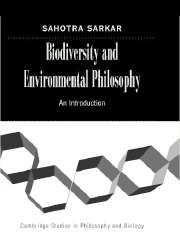Book contents
- Frontmatter
- Contents
- Preface
- Acknowledgments
- Biodiversity and Environmental Philosophy
- 1 Introduction
- 2 Concern for the Environment
- 3 Intrinsic Values and Biocentrism
- 4 Tempered Anthropocentrism
- 5 Problems of Ecology
- 6 The Consensus View of Conservation Biology
- 7 Incommensurability and Uncertainty
- 8 In Conclusion: Issues for the Future
- References
- Index
8 - In Conclusion: Issues for the Future
Published online by Cambridge University Press: 17 July 2009
- Frontmatter
- Contents
- Preface
- Acknowledgments
- Biodiversity and Environmental Philosophy
- 1 Introduction
- 2 Concern for the Environment
- 3 Intrinsic Values and Biocentrism
- 4 Tempered Anthropocentrism
- 5 Problems of Ecology
- 6 The Consensus View of Conservation Biology
- 7 Incommensurability and Uncertainty
- 8 In Conclusion: Issues for the Future
- References
- Index
Summary
This book will not have a traditional conclusion summarizing whatever insights that are presumed to have been provided by the earlier chapters. Rather, this concluding chapter will list and emphasize issues that have been treated only inadequately in the preceding chapters. Professional philosophical interest in biodiversity conservation is so recent that much more work remains to be done, compared to what has so far been accomplished. Most questions have been answered only incompletely, if at all: they remain largely open. In one sense, the conclusion of the last sentence is always true in philosophy construed as an exploration of perennial questions rather than as an attempt to provide definitive answers to them. However, that is not the sense in which the questions discussed here remain open. As also noted in the Preface, professional philosophical work in this area is of very recent vintage. Consequently, whereas almost all the issues explored in this book have received some attention from professional philosophers, except for most of those connected to environmental ethics none have received the detailed attention they deserve. More importantly, they have not received systematic attention jointly. This is a first attempt to bring together the ethical and epistemological issues that emerge from our concern for the environment, especially the depletion of biodiversity, and our attempts to respond to them.
- Type
- Chapter
- Information
- Biodiversity and Environmental PhilosophyAn Introduction, pp. 218 - 230Publisher: Cambridge University PressPrint publication year: 2005



